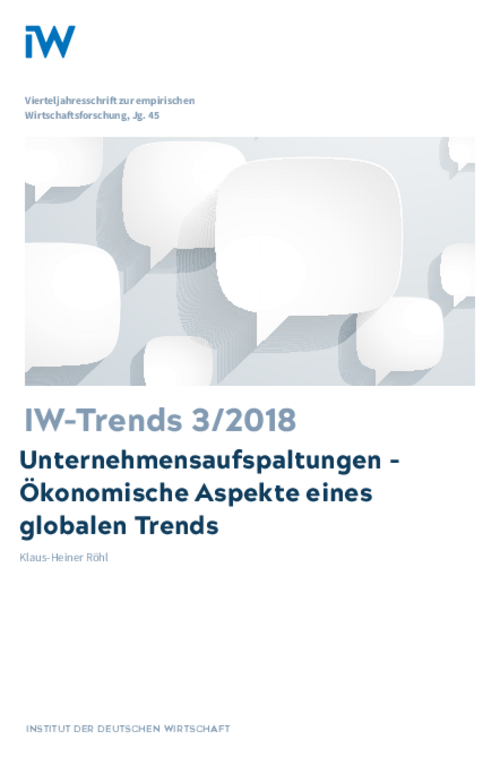While there has long been a trend towards large companies becoming dominant through takeovers, in Germany and internationally an opposite trend has recently set in: the breaking up of companies as a result of sales, IPOs or spin-offs is clearly on the increase.

Business Splits: Economic Aspects of a Global Trend
IW-Trends

While there has long been a trend towards large companies becoming dominant through takeovers, in Germany and internationally an opposite trend has recently set in: the breaking up of companies as a result of sales, IPOs or spin-offs is clearly on the increase.
It is no longer size alone that counts, but increasingly the focus on core business areas. This raises the question of whether the associated risks are currently being ignored, as the positioning of companies in several business segments can act as an insurance against crises in individual sectors. Currently, however, it is widely discussed whether economies of scale and the advantages of diversification have been overestimated and whether the sharp focus of more specialised units offers greater benefits. This is certainly the message coming from the capital markets, where spun-off entities often enjoy a higher valuation as independently listed stock corporations than they had previously done as divisions within a group. Empirical studies show significantly lower valuations for multi-division companies compared to focused companies of comparable size in the same market segments. Since 2006, the S&P US Spin-off Index has provided valuations of split-off listed companies in the USA. In that time this specialised stock index has risen considerably faster than the market-wide S&P 500. Splits are often driven by activist investors such as hedge funds, but there have also been recent examples where the initiative came from the management itself. However, the attractiveness of spinning off companies by means of a market flotation is always likely to depend on the market environment, so that the current trend towards splits may well subside again after a sharp drop in stock market valuations.

Klaus-Heiner Röhl: Unternehmensaufspaltungen – Ökonomische Aspekte eines globalen Trends
IW-Trends

More on the topic

The 9th IW Survey of Further Training
In 2016 some 85 per cent of companies in Germany were active in continuing vocational training, using a broad mix of methods.
IW
Has the German Economy Reached its Limit?: Skilled Labour Shortages as a Brake on Growth
The German economy is performing significantly better than was expected in the first few months of this year. During the course of 2017, certain early fears – especially of a weakening of the global economy due to increasing protectionism – have proved ...
IW